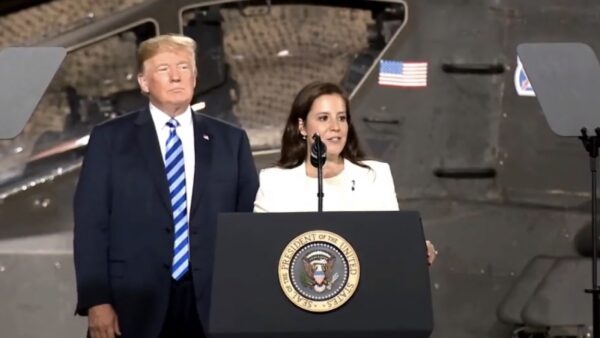Representative Elise Stefanik, Republican of New York, will reportedly chair a bipartisan review of the 9/11 Commission Report, her office announced Thursday, underscoring what she described as the need for vigilance as America faces new and evolving threats.
The review, undertaken by the House Permanent Select Committee on Intelligence, will examine whether the sweeping recommendations of the 2004 report have been fully implemented and whether the intelligence community is prepared to meet the challenges of the 21st century.
The original 585-page report, released three years after the September 11, 2001 terrorist attacks, was searing in its judgment. It concluded “that the institutions charged with protecting our borders, civil aviation and national security did not understand how grave” the threat was before the attacks that killed nearly 3,000 Americans.
The report outlined deep flaws in the intelligence community during the 1990s and early 2000s. It pointed to the CIA and FBI’s shortcomings in intelligence-gathering and counterterrorism, faulting “the combination of an overwhelming number of priorities, flat budgets, an outmoded structure, and bureaucratic rivalries” that left the nation vulnerable.
Among its key recommendations, the commission called for the creation of a National Counterterrorism Center, which began operations in August 2004, and the position of a director of national intelligence, established later that year. It also urged stronger congressional oversight and emphasized the need for a “network-based information sharing system that transcends traditional governmental boundaries.”
The 9/11 Commission warned that America’s defenders — including the FBI and homeland security agencies — had to be strengthened if future attacks were to be prevented.
In a statement, Ms. Stefanik said she was “honored” to lead the review, framing it as part of a larger effort to ensure American security. “As we mark the 25th anniversary of one of the darkest days in U.S. history next year, we must ensure our intelligence community and its capabilities remain one step ahead of our rapidly evolving adversaries,” she said. “While the threats look different today, the mission remains the same: we can never allow a failure to connect the dots to result in catastrophe ever again.”
The working group, according to her office, will hold both public and private events, hearings and classified briefings. Its recommendations are scheduled for release on September 11, 2026, the 25th anniversary of the attacks.
The 9/11 Memorial & Museum records that 2,977 people died that day: 2,753 in New York, 184 at the Pentagon, and 40 aboard Flight 93, which crash-landed in Pennsylvania after passengers fought back against the hijackers.
For Ms. Stefanik, who has emerged as one of the most prominent Republicans in the House, the review is another high-profile role. She was nominated last year by President Donald J. Trump to be U.S. ambassador to the United Nations, though that nomination was withdrawn in March amid concerns within the party about maintaining its slim House majority.
By spearheading the intelligence review, Ms. Stefanik is tying her name to an issue that resonates across partisan lines: keeping America safe and preventing the failures of the past from being repeated.
[READ MORE: Trump Administration Ends Discretionary Grants for Minority-Serving Institutions, Citing Racial Quotas]







